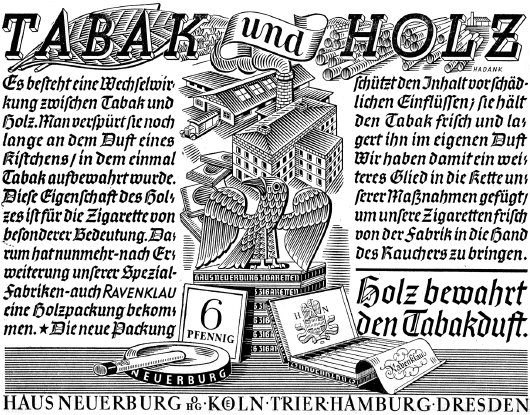Germany
About Andrew Cusack
 Writer, web designer, etc.; born in New York; educated in Argentina, Scotland, and South Africa; now based in London.
Writer, web designer, etc.; born in New York; educated in Argentina, Scotland, and South Africa; now based in London. read more
News
Blogs
Reviews & Periodicals
Arts & Design
World
France
Mitteleuropa
Knickerbockers
Argentina
The Levant
Africa
Cape of Good Hope
Netherlands
Scandinavia
Québec
India
Muscovy
Germany
Academica
The ingenuity of eighteenth century furniture
The Metropolitan Museum is hosting an exhibition, Extravagant Inventions: The Princely Furniture of the Roentgens, that continues for just a few days more. The show looks at the work of Abraham Röntgen and his son David, whose workshop created the most extraordinary pieces of furniture. A few of them are presented here in videos: above, a secretary cabinet, and below, a writing desk, dressing table, and automaton of Marie Antoinette. (more…)
Loriot
Bernhard Victor Christoph Carl von Bülow, one of Germany’s most highly regarded humorists, was born 12 November 1923 and left this world on 22 August 2011. He was better known by his nom de plume of Loriot, the French translation of his surname Bülow, which is German for the oriole bird. Vicco (as his Christian names were shortened to) von Bülow began drawing cartoons for Stern in the 1950s. From cartoons he moved into television in the 1970s and films the following decade. Loriot’s humour focussed on the peculiarities of German people including the awkwardness of everyday situations and miscommunication in human interaction.
Asked in 2007 to describe what his influences were, he said: “I remember that, when I started studying, I was living between a madhouse, a prison and a cemetery. The location alone explains everything, I think.” Lexicographically, he will be remembered for introducing into German the term ‘yodel diploma’ signifying a worthless degree — what in Britain is known as a ‘mickey mouse degree’.
Loriot fans will miss his knowing eyes peering out from behind those familiar reading glasses. R.I.P. (more…)
‘I Have Prussiandom in my Blood’
Loriot on Prussia and Prussianness
 November 2003
November 2003The Viennese weekly Falter interviewed Vicco von Bülow — better known as Loriot — in November of 2003. In part of the dialogue, Loriot explored the Prussianness of his family and upbringing, musing upon some aspects of what it is to be Prussian, turning away from the simplistic categorisations. Via Günter Kaindlstorfer.
…
Loriot: I am committed to my Prussian roots. I was born a Prussian, I have Prussian, so to speak, in my blood. That this defines you for yourself is not new. One is born there, so one has to accept it.
Prussian vices have caused too much harm over the past 150 years.
Loriot: That’s right, I will not deny it at all. Nevertheless, I am proud of my native town of Brandenburg; I am also proud of my country of origin. Here I will not deny, however, that I have been occasionally affected by the disaster that this country has done throughout history, time and again. Only: Which country has, over the centuries, not caused many evils? I will not have the Prussian reduced only to its negative sides. (more…)
The Namibian Way of Reconciliation
Accepting differences, not erasing them, is the path to civic harmony
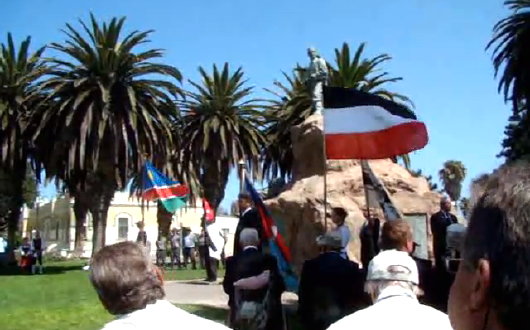
DISCORDIA GERANT ALII, tu felix Namibia reconciliant! Peace and reconciliation are amongst the noblest of earthly aims, but the deluded establishment that rules most of what used to be called the Western world often seem convinced that peace among peoples can only be achieved by erasing the differences between them. Yet it is precisely those differences — the unique characteristics of tribe, clan, and platoon that separate us from some and unite us with others — that make us who we are: human beings, created by God in time and place and circumstance. Without them, we are rootless citizens of nowhere, easily abused and manipulated by the powerful. (How flimsy is even the thickest oak when its roots have been severed). It is the acknowledgement of differences, rather than the erasing of them, that leads to true respect and understanding between and among peoples. While the racial grievance industry thrives in America and Europe, an entirely different attitude exists in happy Namibia. (more…)
Interview with the Last July 20 Plotter
Der Speigel speaks with 88-year-old Ewald von Kleist
Ewald von Kleist is the last surviving member of the circle of Wehrmacht officers who participated in the July 20, 1944 plot to kill Hitler and overthrow the Nazi state. Der Spiegel has translated its interview with him into English, and all four pages feature interesting insights from this brave old man.
And if you read German (I don’t), you might be interested in this article on China & Carl Schmitt.
Mamarazza
The photographs of “Manni” Sayn-Wittgenstein-Sayn
IT’S A CRACKING photo; the sort of thing guaranteed to irk the puritanical and bring a smile to the good-humoured. The thirteen-year-old Yvonne Sayn-Wittgenstein-Sayn takes a swig from a bottle while her brother Alexander, just twelve, sits with a half-smoked cigarette. Taken aboard the yacht of Bartholomé March off Majorca in 1955, the photographer was Marianne “Manni” Sayn-Wittgenstein-Sayn — the mother of Yvonne and Alexander — who’s known by her photographic soubriquet of “Mamarazza”. (more…)
Europe According to Stereotype
A London-based graphic designer has created a series of maps depicting Europe according to the national stereotypes in the minds of various peoples. Yanko Tsvetkov, a Bulgarian living in Great Britain, created the first one in 2009 in the midst of the energy dispute between Russia and the Ukraine. Russia was labelled “Paranoid Oil Empire”, the Ukraine “Gas Stealers”, and the E.U. as “Union of Subsidized Farmers”. Switzerland was simply “Bank”.
“I created the first one in 2009 because at that time there was an energy crisis in Europe,” Mr. Tsvetkov said. “I just created it to amuse my friends but when I put it up on my website so many people liked it that I decided to really focus on the project of mapping the stereotypes based on different places in Europe. I was surprised by the reaction because I never really expected it to take off like this.” (more…)
The Blitz was Wrong
In his latest column for the Mail on Sunday, the commentator and Orwell Prize winner Peter Hitchens shares his thoughts on the Blitz — the Luftwaffe’s bombing campaign over London that commenced sixty years ago this month. His comments have special relevance given the previous posts on andrewcusack.com regarding the immorality of the Hiroshima & Nagasaki bombings, and likewise of the intentional and deliberate targeting of civilian non-combatants. (more…)
Libeskind Strikes Again, in Dresden
The controversial starchitect exacts Poland’s revenge on a German city
THE WAR WAS NOT kind to Dresden: the bombers of the Royal Air Force and the U.S. Army Air Force rained destruction on the Saxon capital, reducing much of the city to piles of rubble, and killing thousands upon thousands of innocent women and children in the process. One of the few buildings to survive the cataclysmic and morally reprehensible bombing campaign was the old garrison, which after the war was turned into a military museum.
Poland, whose unprovoked invasion by the Nazis sparked the Second World War, is exacting a curious revenge on neighbouring Germany, however. Daniel Libeskind, the controversial Polish starchitect, is building a monstrous addition to the Dresden Military History Museum that may not be a crime against humanity, but is undoubtedly a crime against architecture. (more…)
München: mees bewoonbare stad

Hoeveel kere het ek dit hoor sê? München, die Beierse hoofstad, is die mees bewoonbare stad in die wêreld volgens baie lyste deur talle mense saamgestel. Die meeste kenmerk hierdie status aan die unieke kombinasie van tradisie en moderniteit in die stad. Beiere het ’n balans getref, en die Beierse mense is baie trots op hul land — en tereg! Müncher weißwurst — bedien met mosterd en ’n krakeling — is my gunsteling wors. (Jammer, boerewors! Jou Duitse neef is tops.)
In elk geval, op die webtuis van Monocle tydskrif, Tyler Brûlé het ‘n blik op München en ondersoek waarom en ondersoek waarom het dit so ‘n goeie reputasie. Kliek hier om te kyk.
It is scandalous that in all my travels I’ve never been to any part of Germany, let alone Bavaria, considering how everyone raves about it unceasingly. Once I finally get myself to the other side of the pond permanently, it’s high up on the list of places to visit pronto (alongside the Netherlands and Finland). All in good time, all in good time…
“There is no Generation Benedict”
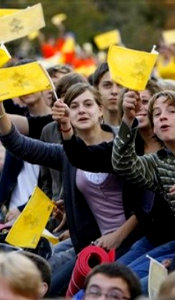 So claims Germany’s Catholic youth leader Dirk Tänzler, who is ‘reserved’ & ‘ambivalent’ about the Pope. Is Tänzler right?
So claims Germany’s Catholic youth leader Dirk Tänzler, who is ‘reserved’ & ‘ambivalent’ about the Pope. Is Tänzler right?
AMIDST THE MEDIA’S attempts to sling mud at Pope Benedict XVI, one of the most prominent Catholic youth leaders in Germany has chimed in with lackluster words about the reigning pontiff. Dirk Tänzler, the head of the BDKJ, the umbrella group of German Catholic youth organizations, gave an interview to Der Spiegel, the prominent weekly news magazine with a circulation of over one million. Asked his verdict of the so-far five years of Pope Benedict’s reign, Tänzler responded with the word “ambivalent”. Contrasting Benedict XVI with John Paul II — a “showmaster” — the BDKJ head said that, despite some good points, “a lot of young people often simply don’t understand him”. “Most have a different idea of how to live their lives than the pope might imagine for them. There is no ‘Generation Benedict.'”
But are Tänzler’s thoughts an accurate reflection of the state of Catholic youth in Germany or elsewhere? Over a million young people travelled to Cologne to experience World Youth Day with the new pontiff in 2005. (The following WYD held in Sydney in 2008, unfortunately offers little comparison given the relative isolation of Australia). Everywhere the Pope has travelled, such as to the Czech Republic last year, or France and the United States in 2008, vast multitudes of youth have greeted him, often waiting hours for the privilege. (more…)
Outside Germany, Press Lack Interest in Odenwaldschule Abuse Scandal
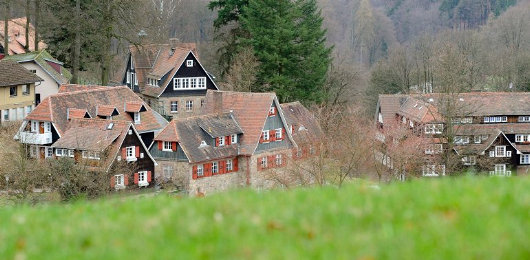
Nestled in rustic style buildings amidst the hills of the Odenwald mountains, Germany’s most prominent progressive boarding school has become embroiled in the latest revelation of abuse in German schools. Almost the entire governing board of the Odenwaldschule has resigned after it was revealed that a culture of permissive abuse of schoolchildren was tolerated from 1966 to 1991, involving at least thirty-three victims and eight teachers, and perhaps more. The details of the case are too lurid for reproduction here, but involve the abuse of students by teachers and even a headmaster, as well as tolerating and sometimes encouraging the abuse of students by other students.
The Odenwaldschule was founded in 1910 by Paul and Edith Geheeb as one of the first schools devoted to “progressive education” in Germany. Amongst other novelties of the school, students were divided into “families” that spanned age groups and were headed by a teacher known as the “mother” or “father” of the “family”. Shut down during the Nazi period, it reopened after the war, and became a UNESCO model school in the 1960s. Among its former students is the Green MEP & former student radical Daniel Cohn-Bendit, who admitted in the 1970s to inappropriate contact with kindergarten students before backtracking after his previous comments were brought to light last year. The school’s progressive “holistic” ethos, emphasizing freedom over discipline, continues to this day. For the current 225 students, the cost of a year’s education at the Odenwaldschule is over $27,000, or £17,000.
The revelations are only the latest among many surrounding Catholic, Protestant, secular schools, as well as the schools of Communist East Germany. Outside Germany, however, the mainstream media have only taken an interest in whichever scandals or stories they can link back to Pope Benedict XVI, or, failing that, his brother Fr. Georg Ratzinger. No English-language media from outside Germany have bothered to report on the Odenwaldschule affair, except for the tiniest of mentions in the Guardian on 17 March.
Potsdam’s City Palace to be Resurrected
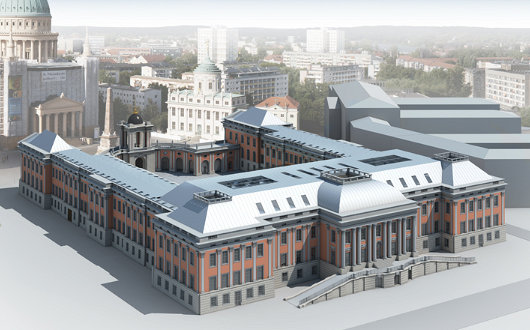
THE OLD STADTSCHLOSS of Potsdam, destroyed by aerial bombing during the Second World War, will rise again next to the Old Market in the Brandenburg capital. The provincial government has decided to rebuild the old Stadtschloss to serve as a home for the Landtag, Brandenburg’s provincial parliament. While it was first conceived of building a modern building on the site, or having some reconstructed façades and others modern, a €20-million donation from the software entrepreneur Hasso Plattner has ensured the façades and massing of the building will follow the outline of the old stadtschloss. The interiors will be simple and modern, and to keep the costs down, much of the finer Baroque detailing of the façades will not be included. “I hope,” Herr Plattner said, “that the necessary compromises do not diminish the great impression overall.” (more…)
The Internal Exile of the Saar
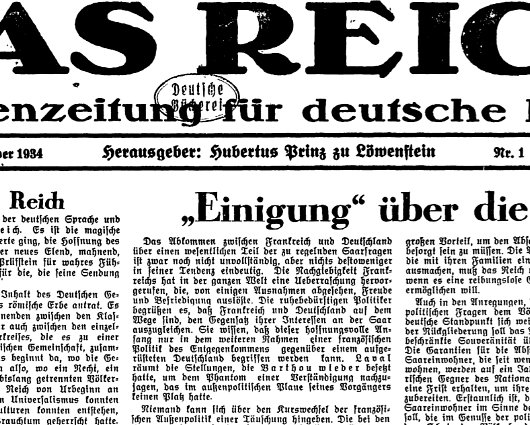
At the beginning of Hitler’s rule, many patriotic German anti-Hitlerites fled to the Saarland, which was Germany but still under French occupation. In a bizarre state of internal exile, anti-Nazi publications, be they Christian, Nationalist, Communist, or Jewish flourished for a very brief period. One of these journals was Das Reich, founded by Hubertus Prinz zu Löwenstein, who (if I recall my personal studies from St Andrews years properly) was a bit of a rogue in his own way, sympathizing with the Red forces during the Spanish Civil War.
A plebiscite on rejoining the Saarland with Germany proper had been scheduled before Hitler’s rise to power (just like the lamentable award of the 1936 Olympics to Berlin, though they turned out to be some of the most influential and well-run games to date) and, while the inhabitants were no keen Hitlerites, they had naturally tired of French occupation and duly voted to kick the French out. Right result, but very poor timing.
The anti-Hitlerites had to flee further, to Paris (where Pariser Tageblatt and later Pariser Tageszeitung were founded), London, and New York. German Jews sometimes fled as far as Shanghai where the English-language Shanghai Jewish Chronicle began a German edition in response to the influx. (There are some interesting stories about Shanghai Jews, and of course the famous newspaper-owning family of Jewish converts to Catholicism in Shanghai, but they’ll have to wait for another day).
The Messiah in the Sportpalast
The following feuilleton was written before Hitler became the master of Germany. The scene is the Berlin Sportpalast, the largest indoor arena in the world when it opened in 1910 and, at this time, the setting for the rallies of the various political parties vying for control of the Weimar Republic.
On the night of the Horst Wessel commemoration Hitler speaks in the Berlin Sportpalast. People who have neither seen nor heard him will perhaps never fully understand the significance of the profoundly ominous mind-set that has developed in Germany since the war. The reality — Hitler’s version of reality and its full implications — goes far beyond anything you might read in the newspapers, or imagine. Here is that reality, drawn from the life. (more…)
How “New Yorker” is the Staats-Zeitung?

When I was a youngin’, one of the joys of Sundays was the trip to the bakery and the newsagent after church. A vast array of newspapers was on hand for perusal while Pop nipped into Topps Bakery next door. We usually only bought The European, but I browsed everything on hand. One of the available titles was the New-Yorker Staats-Zeitung, founded in 1834, and the oldest German newspaper in the New World. The “Staats” was daily from 1854 until 1953, when it went weekly. In the late 1930s, the circulation was about 80,000, falling to 25,000 in the late 1990s, and stands around 10,000 today. It seems a pity that this “New York” newspaper is now edited from Sarasota, Florida instead of from Manhattan, but at least the Staats-Zeitung survives.
A Wanderer Anecdote
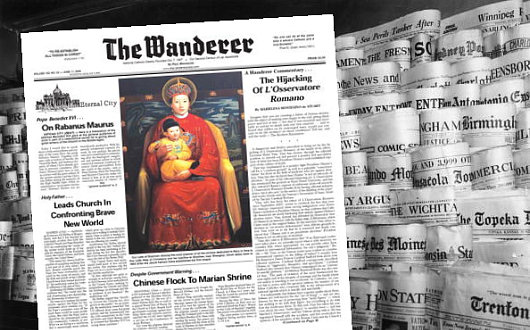
“It’s too easy for theological writers to sling around Abstractions with Capital Letters, as if with each stroke of the pen they’re tapping into Plato’s realm of changeless, ineffable Forms. Or at least that they’re writing in German, where all nouns start with caps.”
So begins John Zmirak, who tells a delightful story about one of America’s premier Catholic newspapers.
“A friend of mine used to write weekly for the estimable investigatory journal The Wanderer. Founded by German-Catholic immigrants, it was published auf Deutsch well into the twentieth century.
As my friend recalled, ‘The editors were, I think, waiting for the rest of the country to catch up with them. At last they admitted that this was unlikely, and agreed to translate the paper. But they kept on as their typesetter someone named Uncle Otto, who for years insisted on capitalizing every noun.’”
The Freiherr of Finance

Germany’s new finance minister, Freiherr zu Guttenberg & his wife, Freifrau Stephanie.
Unmentioned by this editorial is that Baron zu Guttenberg’s grandfather (his mother’s father) was the late German winemaker & Croatian politician the Count of Vukovar. From the Count, Baron zu Guttenberg is descended from the noble house of Eltz, who are responsible for one of my favourite castles in the whole world, Burg Eltz, which once graced the 500-deutschmark note.
At the ripe age of 70, the Count of Vukovar took up arms in defence of the town of Vukovar during the Yugoslav Wars of 1991. The Count was elected to the Croatian parliament the following year as an independent, and served in that body until 1999, when he retired from politics. Nonetheless, the Croatian parliament persuaded him to accept honourary membership of parliament in his own right, in which role he continued until his death in 2006.
The Baron’s wife, meanwhile, is Stephanie, Countess of Bismarck-Schönhausen, great-great-granddaughter of the “Iron Chancellor”, Otto von Bismarck. A portent of this economics minister’s future?
Search
Instagram: @andcusack
Click here for my Instagram photos.Most Recent Posts
- Burns Tower April 19, 2024
- Patrick in Parliament March 18, 2024
- Articles of Note: 13 March 2024 March 13, 2024
- Cambridge March 9, 2024
- Taken on Trust March 4, 2024
Most Recent Comments
Book Wishlist
Monthly Archives
Categories

